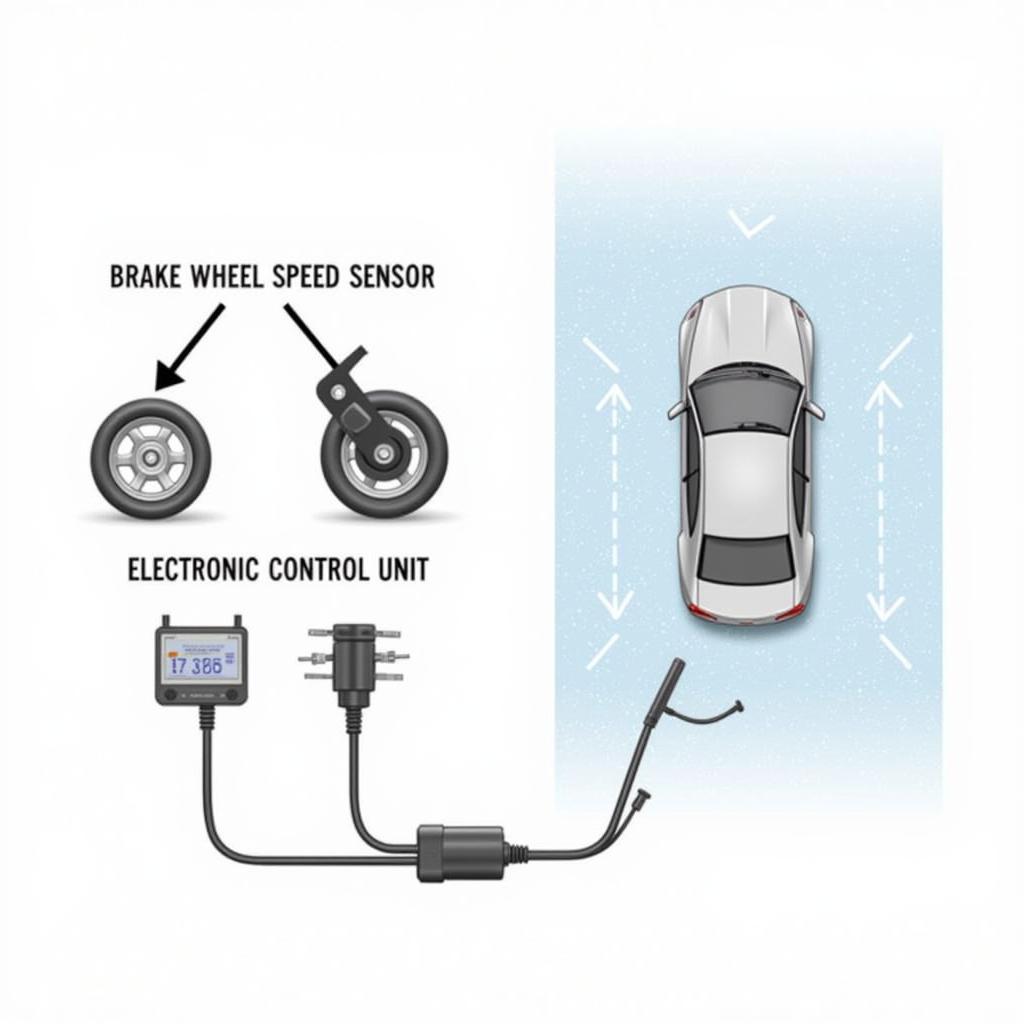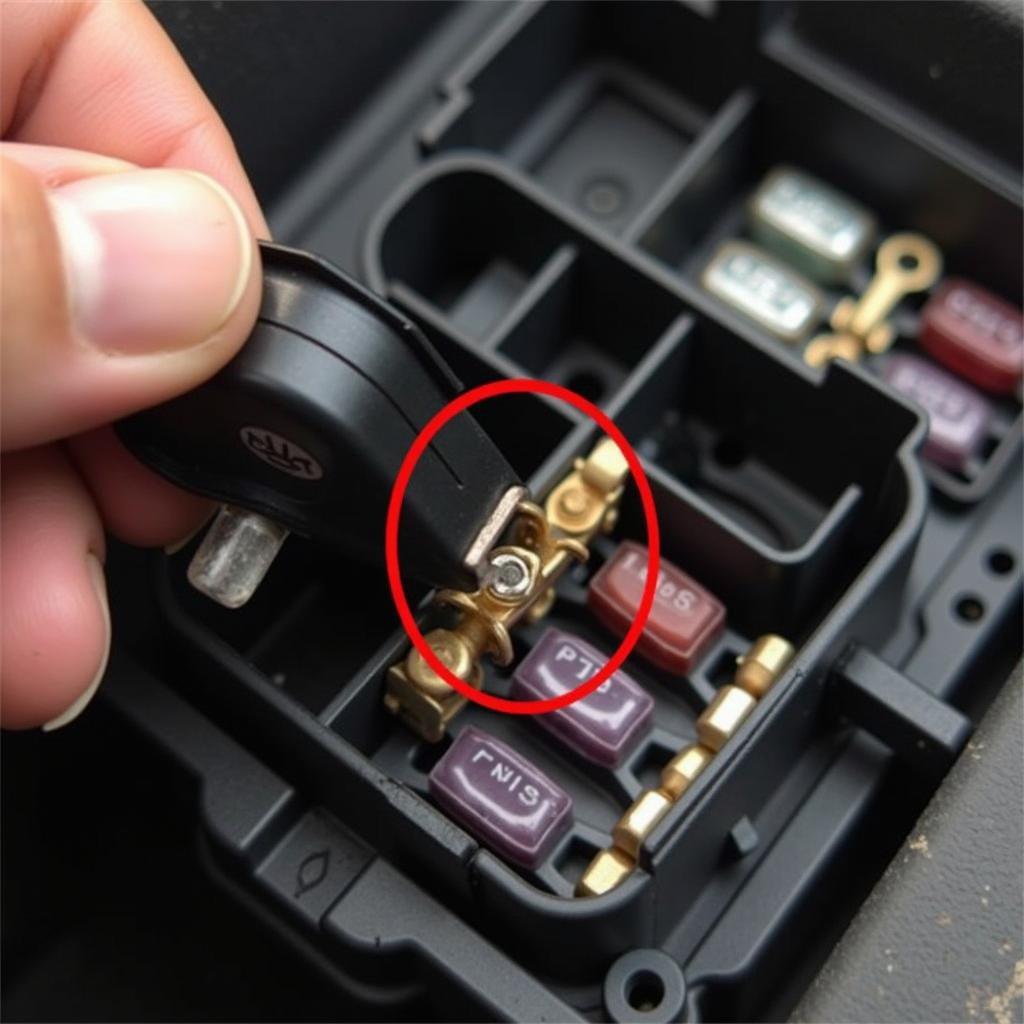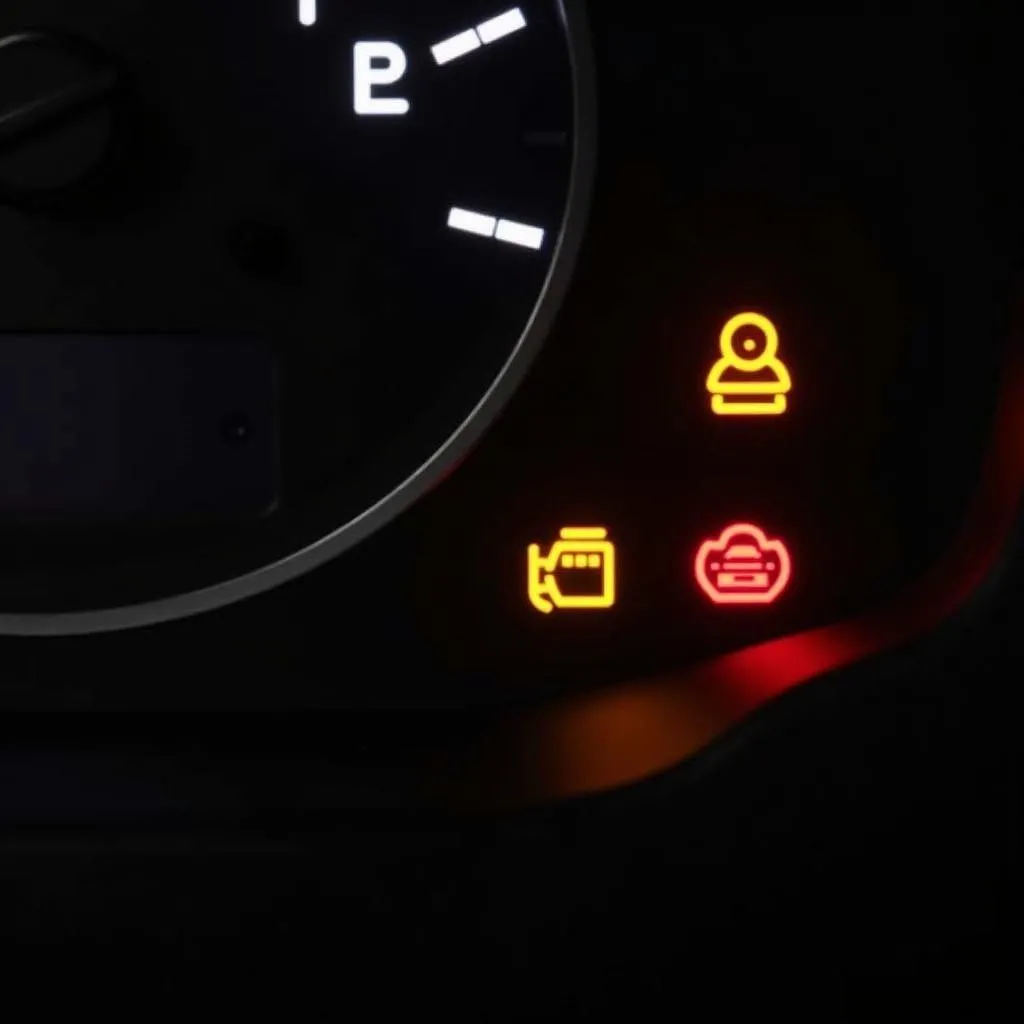The anti-lock brake system (ABS) light on your dashboard is a critical safety indicator. If your anti-lock brakes warning light stays on, it signals a potential issue that requires your immediate attention. Ignoring this warning could jeopardize your safety and the safety of others on the road. Don’t worry, we’re here to break down the common causes and provide you with actionable solutions.
Understanding Your ABS System
Before we delve into the reasons behind a persistent ABS warning light, let’s quickly recap what the ABS system does. The anti-lock braking system is a life-saving technology that prevents your wheels from locking up during hard braking. This function helps you maintain steering control and avoid skidding, especially on slick surfaces.
 ABS System Illustration
ABS System Illustration
Why Your Anti-Lock Brakes Warning Light Stays On
A illuminated ABS warning light indicates that your car’s computer has detected a problem within the ABS system. Here are some of the most frequent culprits:
-
Faulty Wheel Speed Sensors: These sensors, positioned at each wheel, monitor wheel speed and relay this information to the ABS control module. A malfunctioning or dirty sensor can send inaccurate data, triggering the warning light.
-
ABS Control Module Issues: This module acts as the brain of your ABS system. If it experiences electrical problems or malfunctions, it can disrupt the entire system’s operation.
-
Low Brake Fluid Level: Brake fluid is the lifeblood of your braking system, including the ABS. A low fluid level often points to a leak, which can hinder proper ABS function.
-
Hydraulic System Problems: Issues within the ABS hydraulic unit, such as a malfunctioning valve or pump, can also cause the warning light to illuminate.
-
Blown Fuse or Electrical Fault: Like any electrical system in your vehicle, the ABS relies on fuses and wiring. A blown fuse or a short circuit can disrupt the electrical signals, leading to system failure.
What to Do When Your Anti-Lock Brakes Warning Light Stays On
“A constantly illuminated ABS warning light shouldn’t be ignored,” says master automotive electrician John Miller. “It’s a clear sign that a critical safety system needs attention.”
Here’s what you should do:
-
Don’t Panic, But Be Cautious: While a illuminated ABS light is concerning, it doesn’t mean your brakes have failed completely. However, be aware that your ABS might not engage properly during hard braking.
-
Check Your Brake Fluid: This is a simple check you can do yourself. Locate the brake fluid reservoir under the hood (refer to your owner’s manual if unsure) and inspect the fluid level. If it’s low, add the recommended brake fluid type. However, be aware that low brake fluid is often a sign of a leak, which requires professional attention.
-
Schedule an Inspection: If the brake fluid level is normal or topping it off doesn’t resolve the issue, it’s time to schedule an inspection with a qualified mechanic specializing in automotive diagnostics and ABS systems.
your anti-lock brakes warning light stays on
Diagnosing the Problem: What to Expect
Modern vehicles rely heavily on computer systems, and the ABS is no exception. A mechanic will typically connect a specialized diagnostic tool to your car’s onboard computer to read the stored fault codes. These codes provide valuable clues about the nature of the problem. Depending on the codes and symptoms, the mechanic might:
-
Inspect the Wheel Speed Sensors: This may involve checking the sensors for damage, cleaning them, or testing their electrical signals.
-
Test the ABS Control Module: The mechanic will verify that the module is receiving power and communicating correctly with other vehicle systems. In some cases, the module might require reprogramming or replacement.
-
Examine the Hydraulic System: This includes checking the hydraulic unit for leaks, testing the pump and valves, and ensuring proper fluid pressure.
your anti-lock brakes warning light stays on. you should
The Importance of Addressing the Issue Promptly
“Delaying repairs to a faulty ABS system is never a good idea,” cautions Miller. “Driving with a compromised ABS system increases the risk of accidents, especially in adverse weather conditions.”
Ignoring a persistent ABS warning light can lead to:
-
Reduced Braking Performance: While your regular brakes should still function, you won’t have the added safety net of ABS, potentially increasing stopping distances.
-
Increased Risk of Skidding: Without ABS, your wheels can lock up during hard braking, making it difficult to maintain control, especially on wet or icy roads.
-
Costlier Repairs: What might start as a minor sensor issue can escalate into a major problem if ignored, potentially leading to expensive repairs down the line.
 Mechanic Diagnosing ABS Problem
Mechanic Diagnosing ABS Problem
Anti-Lock Brakes Warning Light Stays On: FAQs
Q: Can I drive my car if the ABS light is on?
A: While you can technically drive with the ABS light on, it’s not recommended. Your ABS system is compromised, reducing your safety margin, especially during hard braking.
Q: How much does it cost to fix an ABS light?
A: Repair costs vary widely depending on the underlying problem. A simple sensor replacement might cost a few hundred dollars, while a faulty ABS control module could cost significantly more.
anti lock brakes abs warning light stays on
Q: Can I check the ABS system myself?
A: Basic checks like inspecting the brake fluid level are possible. However, diagnosing and repairing ABS problems often requires specialized tools and expertise best left to qualified mechanics.
Q: How often should the ABS system be serviced?
A: While there’s no set service interval for the ABS system, it’s a good practice to have it inspected by a qualified mechanic at least once a year or as part of your regular vehicle maintenance.
Take Control: Prioritize Your Safety
A illuminated anti-lock brakes warning light is your car’s way of telling you something is wrong. Don’t hit the ignore button on safety. Address the issue promptly to ensure your vehicle’s braking system is in top condition, providing you with the peace of mind you deserve on the road.


